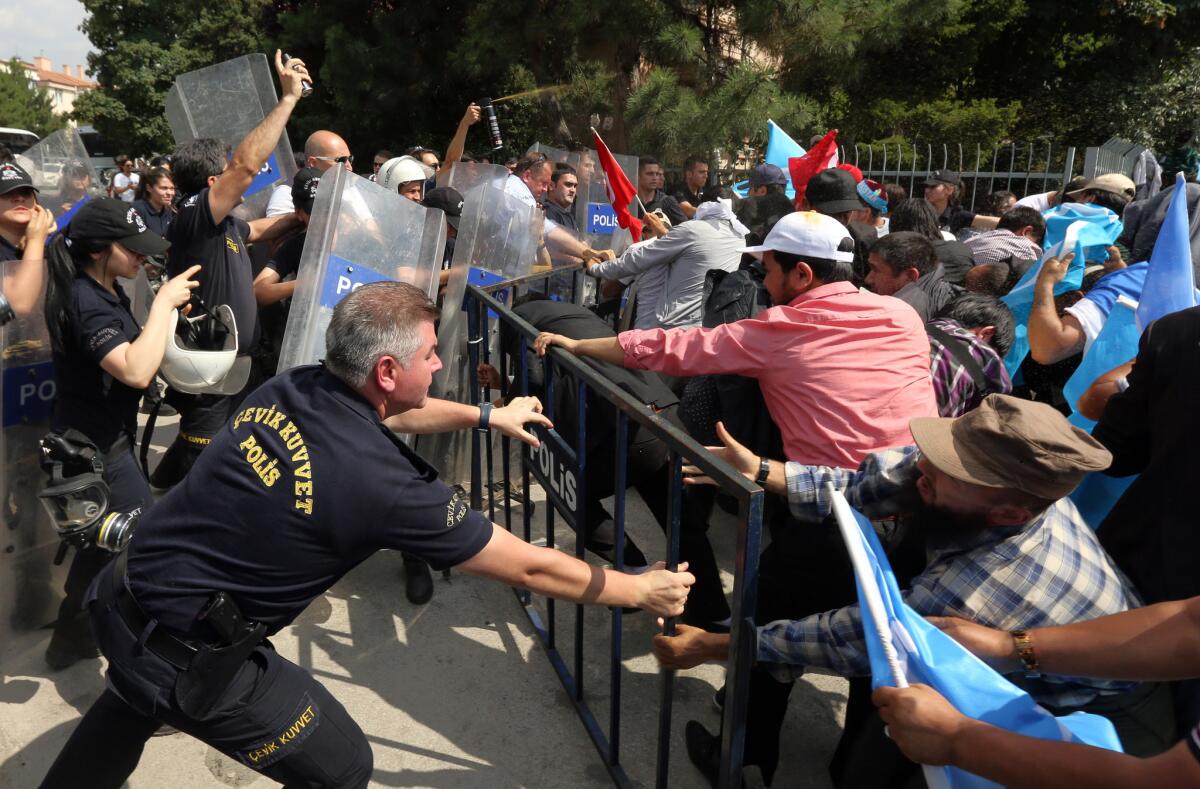Thailand’s deportation of Uighurs seen as diplomatic coup for China

Riot police use pepper spray to push back ethnic Uighur protesters trying to break through a barricade outside the Chinese Embassy in Ankara, Turkey, on June 9.
- Share via
Reporting from Beijing — Chinese state media on Friday trumpeted the forced return from Thailand of more than 100 ethnic Uighur refugees, a sign of Beijing’s growing diplomatic clout in Southeast Asia.
Thailand’s action Thursday came despite protests from the United Nations and human rights organizations, which fear that the Uighurs will face arrest and persecution in China.
The deportations also drew condemnation from the United States and Turkey, which shares cultural and religious ties with the refugees.
Police in the Turkish capital, Ankara, used pepper spray to drive back Uighur protesters who tried to break through a barricade outside the Thai Embassy on Thursday, and the Thai Consulate in Istanbul was ransacked, news reports said.
Officials in Thailand defended the decision, saying they had received assurances from Beijing of the Uighurs’ safety.
However, Chinese Foreign Ministry spokeswoman Hua Chunying said action would be taken against those suspected of breaking the law. Chinese state media said they included “criminals” and “terrorists.”
“It’s baseless to call these illegal immigrants ‘refugees,’” Hua told reporters Friday. “Doing so is to condone their unlawful activities.”
Chinese authorities blame Uighur separatists for bombings and stabbings in the country’s far western Xinjiang province, where ethnic violence has killed hundreds in recent years.
The Uighurs, a Turkic-speaking Muslim minority, have long complained of cultural and religious suppression under Chinese rule.
Growing numbers of them have been making risky attempts to leave China as authorities there have redoubled efforts to stamp out separatism and Islamic extremism, including mass arrests and a ban on certain kinds of head coverings.
Many have been traveling clandestinely through Southeast Asia in an attempt to reach Turkey, which took in a group of 170 Uighurs deported from Thailand.
Thailand’s deputy government spokesman, Maj. Gen. Verachon Sukhonthapatipak, told reporters Thursday that the country has been working to establish the nationalities of those arriving illegally before relocating them.
He denied reports by Uighur activists that the refugees resisted deportation and that some were injured. Two witnesses quoted by the Associated Press said the men were handcuffed and some of the women were crying for help when they were led into trucks to be driven to Bangkok’s military airport.
“This is a diplomatic feat Beijing will use to send a signal to the Uighurs,” said Dilxadi Rexiti, a Sweden-based spokesperson for the World Uyghur Congress. “What they are after is a life with dignity. But the Chinese government will slap them with charges and punishments based on whatever is politically expedient.”
Although the number deported from Thailand is unusually large, it is not the first country to return Uighurs to China.
In 2009, Cambodia sent back 20 Uighurs who had tried to claim asylum there. Four others are awaiting judgment on terrorism charges in Indonesia and are also facing repatriation to China.
“The arm of Chinese law is getting longer, and these countries are trying to curry favor with China by being very responsive to its national security concerns,” said Zachary Abuza, a researcher on Southeast Asian security issues based in Boston.
Thailand has been forging closer military and economic ties with China since its military took control in Bangkok in May 2014, drawing criticism from its longtime ally, the United States.
China is Thailand’s largest trading partner, spending billions a year on food, raw materials and manufactured goods from the country.
On a visit to Thailand in December, Chinese Primier Li Keqiang signed agreements to further increase rice and rubber imports.
The two countries have also stepped up joint military exercises and recently closed a deal for Thailand to purchase three Chinese submarines at a cost of $1 billion.
Rexiti, of the World Uyghur Congress, said about 60 Uighurs are still in the custody of the Thai government pending deportation.
“I hope the Thai government will live up to its promise not to send them back to China and instead consider resettling them in a third country based on their wishes,” he said.
Law is a special correspondent.
More to Read
Sign up for Essential California
The most important California stories and recommendations in your inbox every morning.
You may occasionally receive promotional content from the Los Angeles Times.













